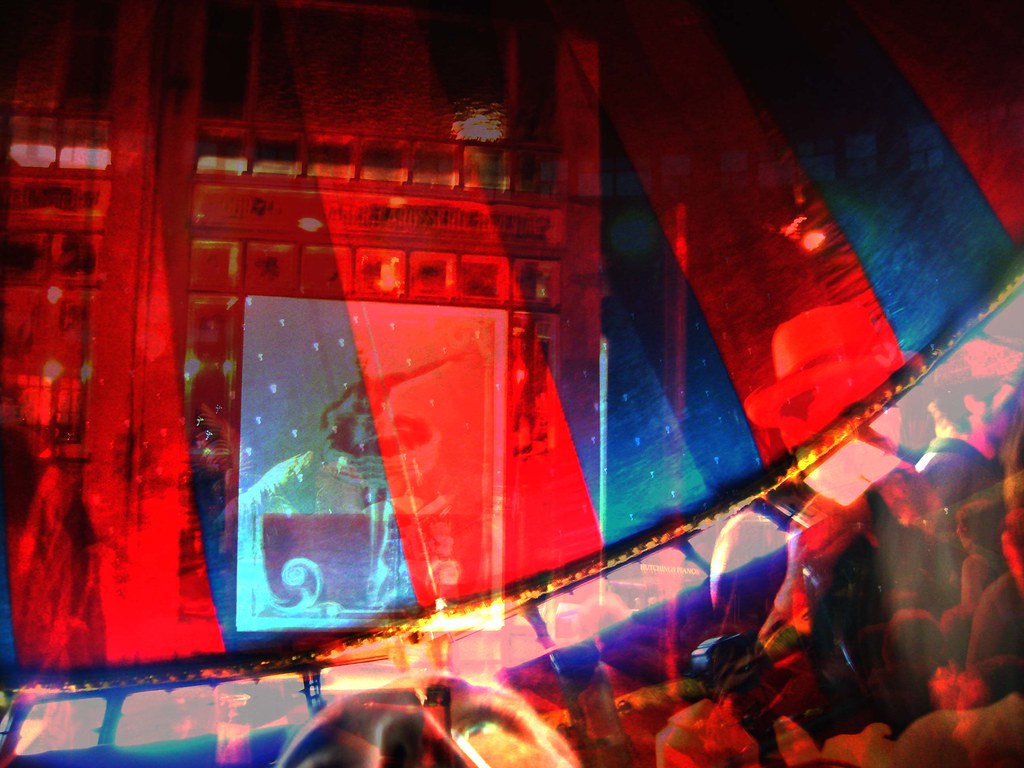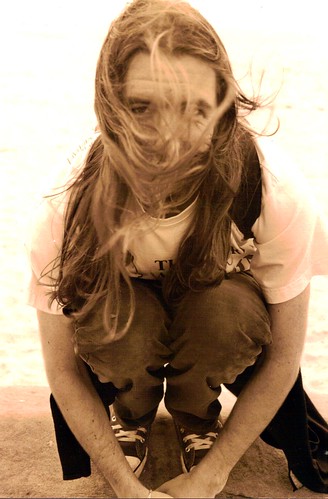
by Ella Mullins
PJ Harvey
Sydney Opera House
February 15, 2008
The many masks of PJ Harvey – just who is the real Polly Jean?
The first time I saw PJ perform she was dressed to kill – long limbs fleeing her man-eating blood red dress (with lips to match), a vampiress stepping straight onto stage fresh from a fleshy feast. The set was charged with hunger and hurt and was PJ the axe-murdering guitar queen.
The last tour she was dressed not so much to the nines as the twos or maybe threes, a fluorescent mess scratching out the curled lip dirty cut-up blues trash of Uh Huh Her.
This time, in the rarefied majesty that is the Sydney Opera House Concert Hall, we were witness to yet another creature all together. With frightful paleness, dark hair piled high into a hive compiled by outré bees and a long black dress both rags and riches, dripping silver sparkles, she seemed to have stepped straight from a Tim Burton dreamscape.
It may seem a tad off the point to be discussing outfit choice rather than simply the music, but that would be to miss half the PJ experience. This is very much a show steeped in performance, in the sense that while at heart it is of course about the music, what seems to be happening overall is a working through of deeper levels, a journey of self-discovery that we relate to for we all undertake a parallel path in one way or another.
With each new PJ encounter, it’s as though she is trying all of these lives on, looking for which might fit. The angry, pained caterwauling and Doc Marten stomp from the early days of Dry and Rid of Me, the vamp sassiness of To Bring You My Love, the windswept, troubled landscapes of Is This Desire? – all were on the one hand PJ through and through, yet on the other it felt like she was also struggling to find her way; we were witnessing a ‘becoming' more than simply a reflection of a space in which she had already grown comfortable.
The same seemed to be true with Stories From the City, Stories From The Sea – the girl from the gently undulating English countryside smitten by New York City and its ceaseless promise, its vertiginous verticality, but ultimately unable to give it the name 'home'. Its follow-up Uh Huh Her read as a reaction to the polish and easy Friday night glamour of Stories, a deliberately confrontational cut and paste tantrum.
Each album serves almost a denial of the last – is certainly reactionary at the very least. But it’s not merely a flip to a flop, a busy, highly produced album giving way to a stripped back counter, then back again. Each is a progression on the last, even if it’s via denial and rejection.
In many ways this is the secret to PJ's ongoing appeal, and her continued relevance as an artist. She appears forever to be struggling against boundaries, pushing the envelope – then licking it, hopping in, closing it up and sending it off to some new place altogether.
This has all taken place over a period spanning more than 15 years, so it was intriguing to see the journey in miniature tonight. Playing handfuls of works off pretty much every album, the songs were bracketed together from each era, clusters nudging shoulders with their usurpers, but all getting along just fine, letting bygones be bygones.
Opening with the sparse menace of ‘To Bring You My Love’, the welcome mat was laid out by the guitar-wielding dominatrix in (metaphorical) shiny boots of leather. Those unmistakable six notes, the third deliciously slurred, drawing us in with ease. Each set tends to begin with one of her opening album tracks, songs that have always been perfectly selected to reel us in and not let go. This did just that, that half-pace opening, the perfectly measured distortion and a promise we couldn’t refuse.
'Send His Love To Me' let added a hint of dark folk to the mix, before PJ took to the piano stool for the first of her White Chalk pieces. The disturbing ‘When Under Ether’ was an ideal entry point, setting the mood for what was to follow. Not everyone’s taken immediately to the predominantly piano ballad driven White Chalk, missing, perhaps, the guitar, bass and drums set-up. But this adventurous leap into unchartered waters is a slow-growing delight, and the well selected pieces from it tonight were brought to life with a shiver-inducing touch.
The mood is cool and creepy, Victorian drama evocative of late 18th century London. It’s a snapshot of life hidden in sunless back alleys, mossy cobblestones and dankness, houses of ill repute and gas lanterns, unimaginable poverty and coughs that take root and never leave. The instrumentation is mostly acoustic – piano, acoustic guitar, harmonica. At certain points it’s not a long way from what Grant Lee Phillips has been doing for some time, but instead of exploring the different layers of the small town American past, it’s thoroughly, unapologetically British – Dickensianly dystopic. It may be because I’m re-reading Angela Carter’s Nights at the Circus, but it seems a perfect fit for that slightly unreal underbelly of London’s shady past, the soundtrack to the larger than life past being recounted by Fevvers.
Such leaps and projections are easily made, as with PJ there’s always a sense that these songs are inhabited by a cast of conflicted characters. Some bold some shy, some wise some naive, many seeming salvaged from a history that would have otherwise overlooked them completely. Over the course of the journey the possibly misguided suspicion dawns that these characters are all facets of the one complex, contradictory soul. But don't let her here you say so.
The sense of this is very strong with White Chalk, a return to an approach last truly developed on Is This Desire?, from which the next batch of songs were drawn. Delicate and piano driven at one end and drum-machine and synthesiser cold at the other, it’s highly unusual to have any of these songs worked into a live set. This is PJ’s most under-rated album, lost between the cracks in just the way its characters all were until PJ salvaged their memory from the far-flung corners of forgotten time. So the fragile beauty of ‘Angelene’ took us back to that moment PJ first allowed us to peer behind the curtains to a gentler, fractured side. It was a touching caress of the cheek that turned into a back-handed slap in the form of the frumpy, squelching, fuzzed up ‘My Beautiful Leah’, and the disembodied ghostly horror of 'Electric Light'.
As well as being a dab hand at just about any instrument that comes within reach, PJ can sing a little. Her voice will twist and turn on the merest whim – from witch’s cackle to banshee wail and rumbling bearded lady in the blink of an eye, soaring at times to the roof a long way above, spilling on the floor in a glorious broken mess at other.
Her ability to swing so effortlessly from style to style and persona to persona is not as unsettling or off-putting as it could be in a lesser talent. She’s not exactly a chameleon, for each change builds a layer upon the prior. She’s what she was and what she is now, an oil-painting where each stroke, even if we can only see its ghost, is as essential as the last.
Weaving through the icily clanging 'Silence' and austere 'The Mountain', watching her come up 'Mansize' and riding the horses in her dreams as we joined her 'Down By The Water' - infanticide at its catchiest - one was led to wonder. Who, then, is Polly Jean Harvey? For songs so simple in structure, so upfront about their intentions, the question is surprisingly complex. And the stream of potential answers could be endless, or could be dead simple.
After all of this, she's still just a West Country girl with a big fat cat, who brought her mum along to see her play at the Sydney Opera House – and then dropped a very, very rude word.


No comments:
Post a Comment